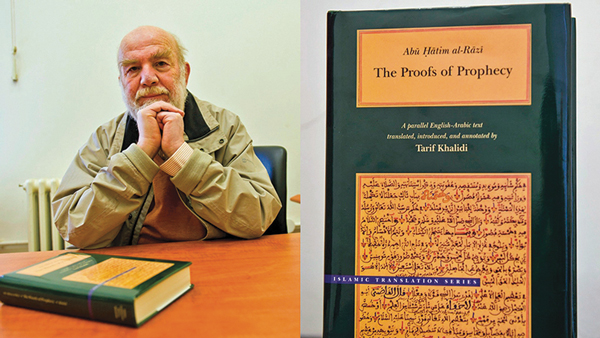Tarif Khalidi, born in Jerusalem in 1938, is a brother of Walid Khalidi. He received his first two degrees from University College, Oxford, and a PhD from the University of Chicago, before becoming a professor in the Department of History at the American University of Beirut from 1970 to 1996. In 1985, he accepted a one-year position as senior research associate at St Anthony’s College, Oxford, and from 1991 to 1992 he was a visiting overseas scholar at St John’s College, Cambridge.
In 1996, he left Beirut to become a professor of Arabic at Cambridge University, filling the oldest chair of Arabic in the English-speaking world. In addition, he was director of the Centre for Middle East and Islamic Studies and a Fellow of King’s College, Cambridge. In 2002, Professor Khalidi returned to the American University of Beirut, taking on the Sheikh Zayed Chair in Islamic and Arabic Studies, the first chair to be filled at the university since the civil war.
Dr. Tarif Khalidi has published many books, including Images of Muhammad (Random House, 2009), The Muslim Jesus (Harvard University Press, 2001), Arabic Historical Thought in the Classical Period (Cambridge University Press, 1995), and Classical Arab Islam (Darwin Press, 1996). He has also published a recent translation of the Qur’an (Penguin, 2008) and edited a collection of essays, Land Tenure and Social Transformation in the Middle East (Syracuse University Press, 1985).
Dr. Khalidi’s translation of the Qur’an has been praised by the Times Literary Supplement as a “landmark in the history of Qur’an translations.” The Guardian called it a “magnificent achievement” and praised its author for communicating the meaning of the original Arabic text while capturing its allusiveness, tone, and texture, and for offering a new perspective. While Muslims have considered previous translations a source of discomfort, distorting the meaning of the original holy book, Dr. Khalidi’s faithful translation shows “a shift from the old Orientalist way of presenting the Qur’an in English to a new inclusive way that takes Muslims’ appreciation of their sacred text into account” (The Guardian).


